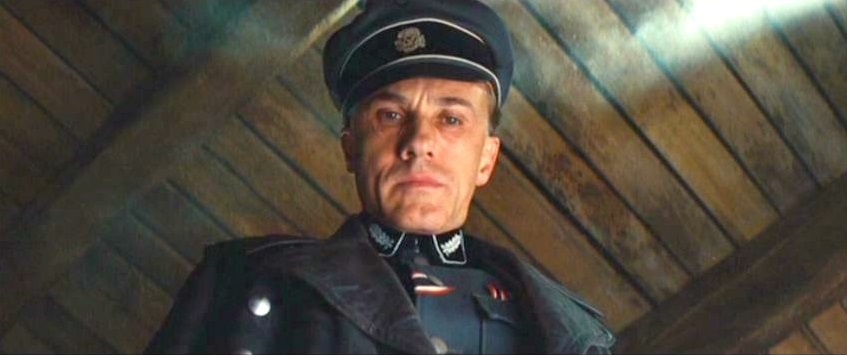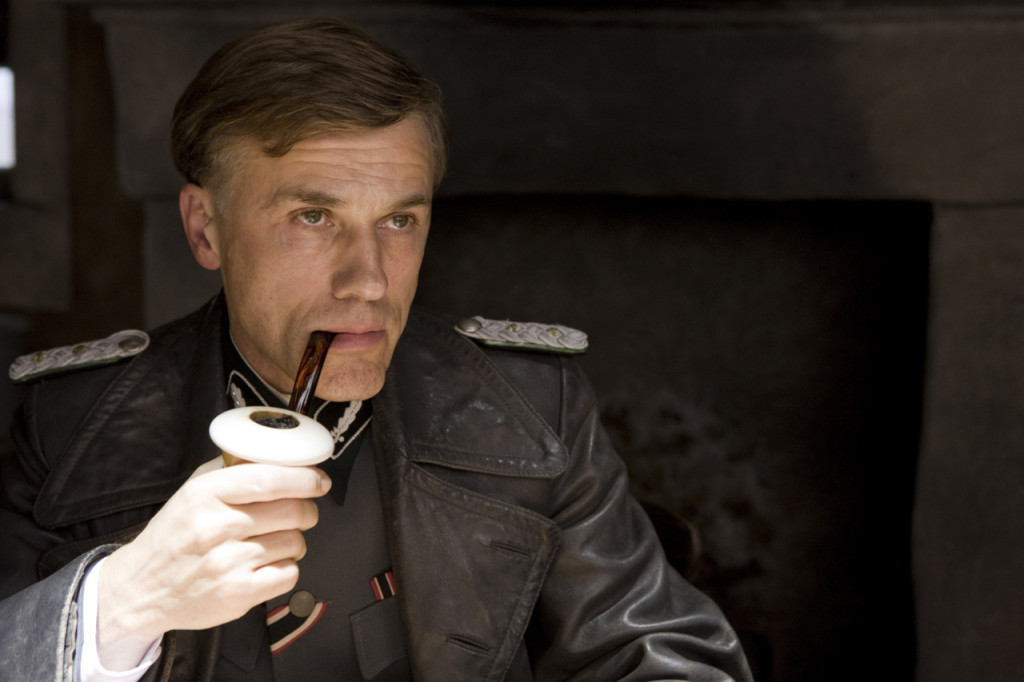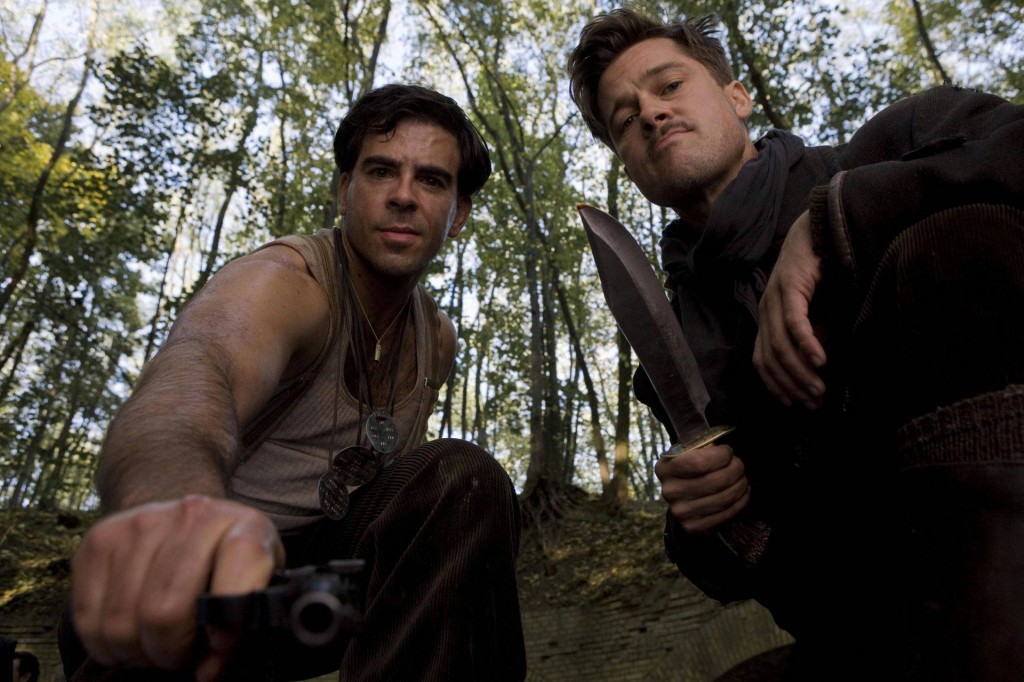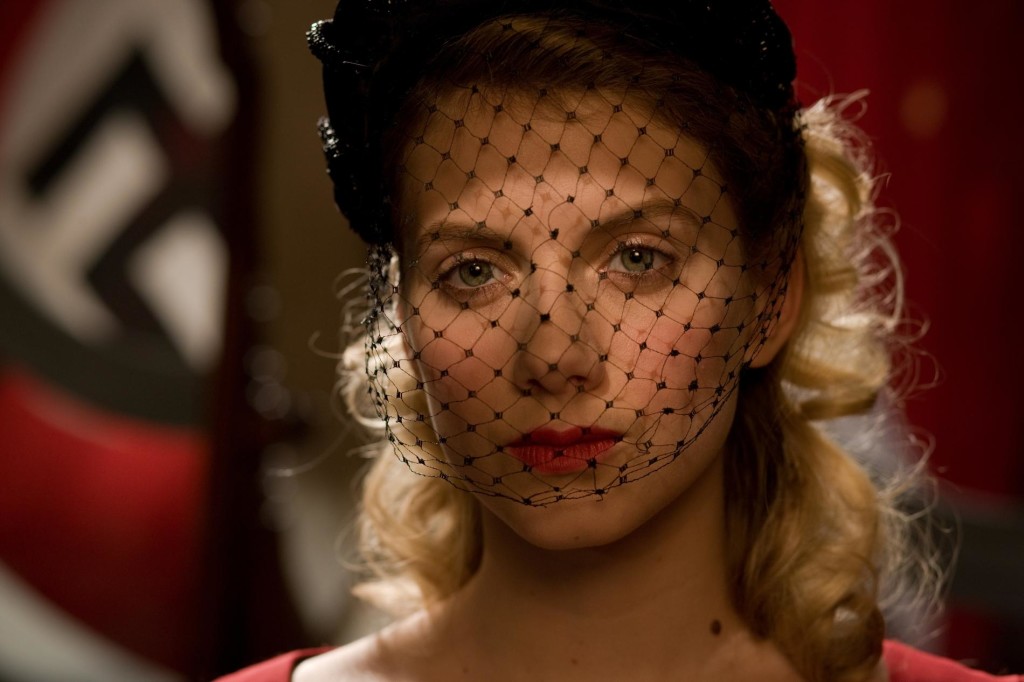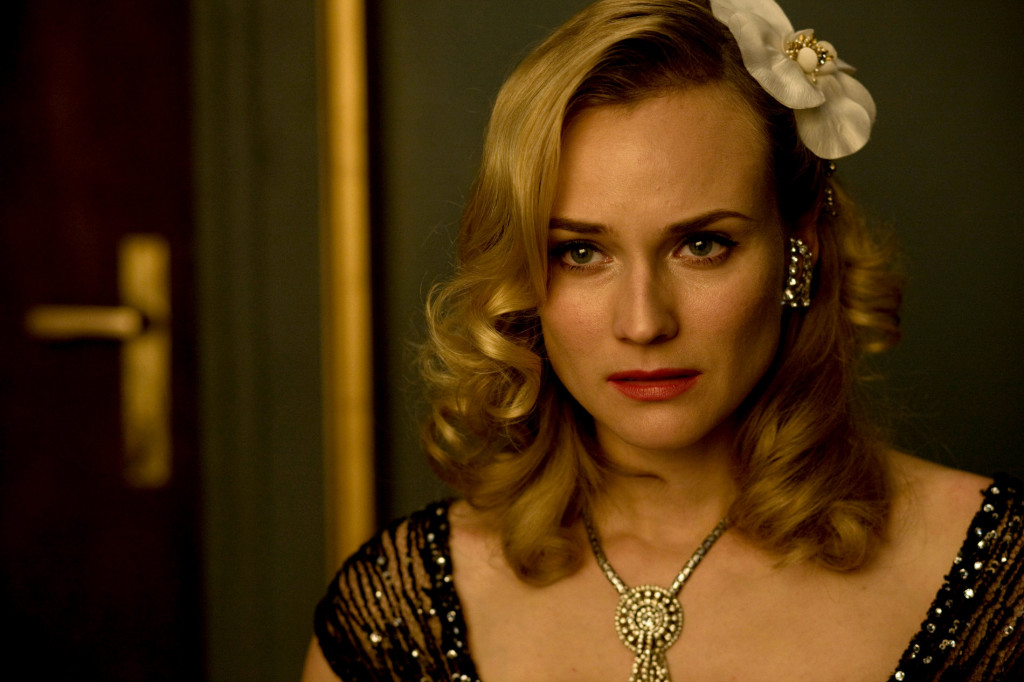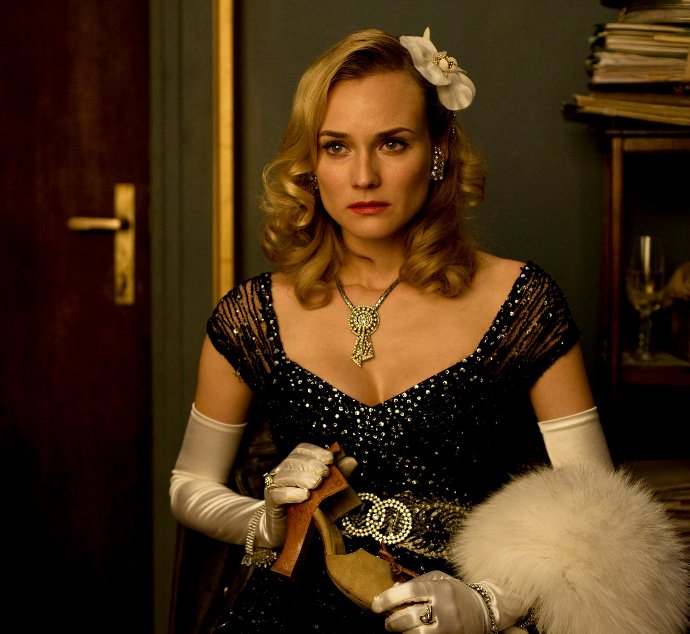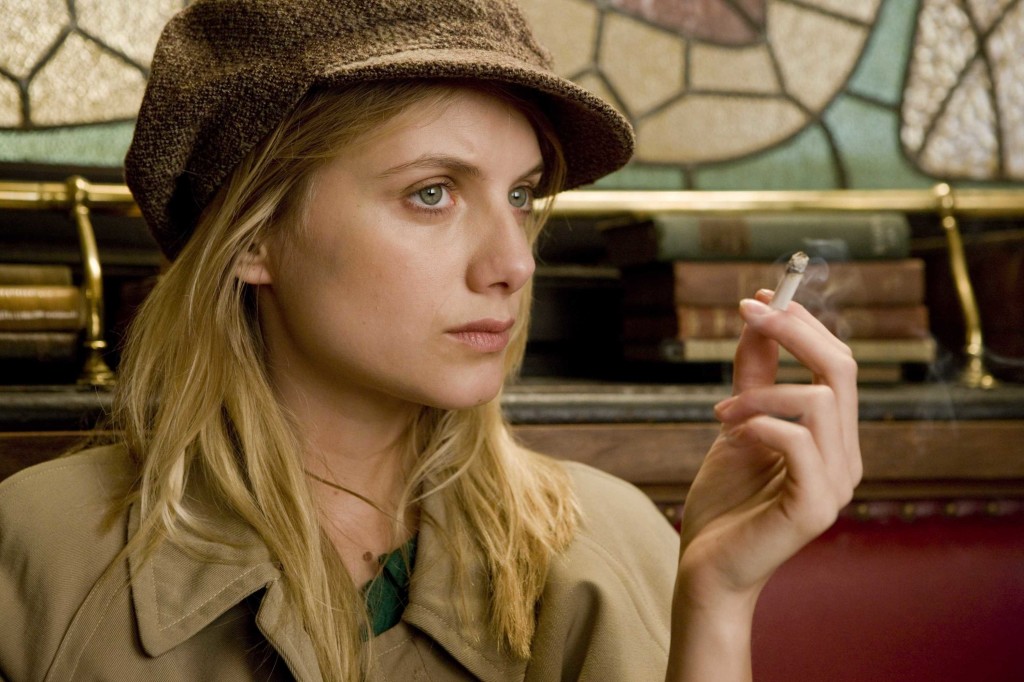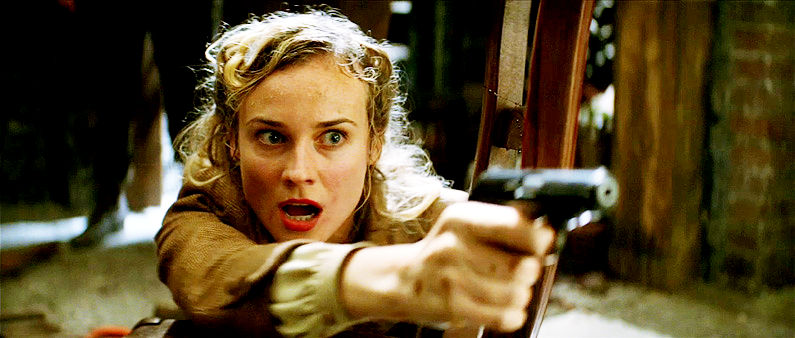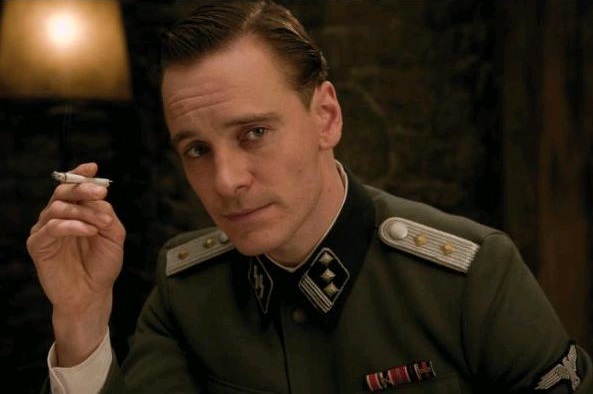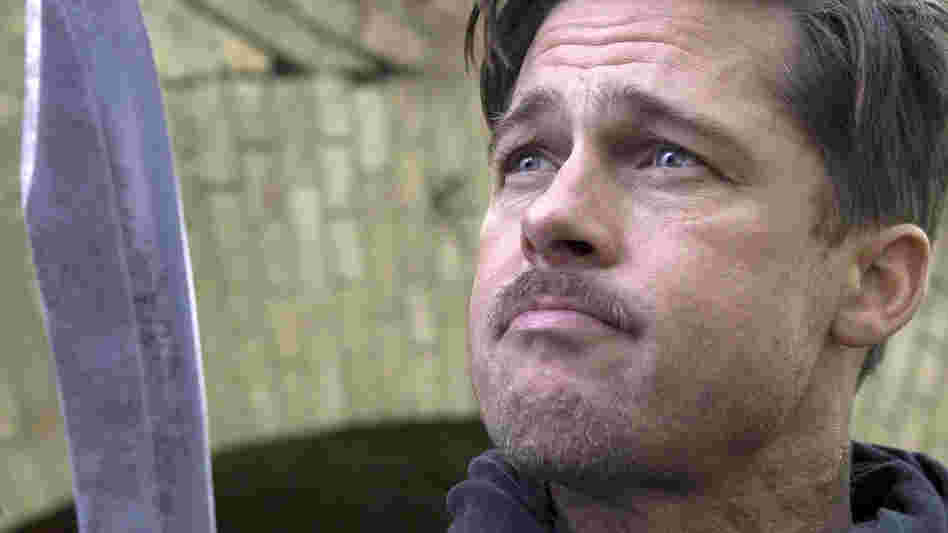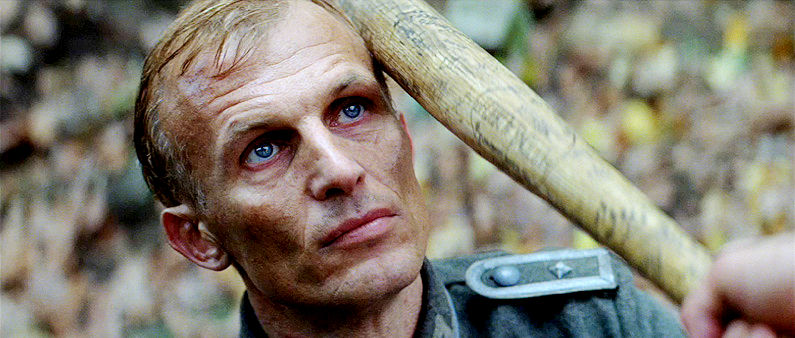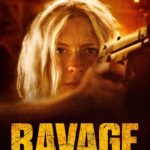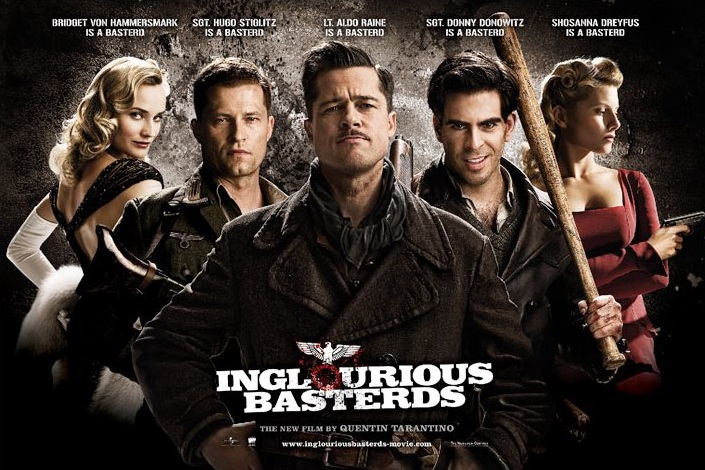 “A basterds work is never done.” ~ Lt. Aldo Raine
“A basterds work is never done.” ~ Lt. Aldo Raine
The story begins in Nazi-occupied France, early in the war. SS-Standartenführer Hans Landa (Christoph Waltz) arrives at an isolated dairy farm in the French countryside to very thoroughly do his job of hunting Jews. He has, thus far, done his job so well that he has earned the nickname “The Jew Hunter.” He even considers it a term of endearment, counting the numbers who know him. Landa, in his cunning, skillful thinking (he so prides himself in possessing) suspects that the French landowner is sheltering Jews on his premises. Actually, Landa considers himself to know because, as he says, “I think like those I hunt.” What a good Nazi basterd he is!
The slow buildup of tension in the above scene is so perfect that I cannot imagine it being done better. In just twenty minutes of mostly dialogue alone, QuintinTarantino is able to build a level of suspense that few directors could do after loads of superficial action so typical in Hollywood. Yes, with directors of lesser talent, this scene could get boring fast; but, with Tarantino, it never does (and never would, even if it went on for another twenty minutes.) Tarantino has the gift of making dialogue alone the satisfying subject of a feature film; and here, with the help of Christoph Waltz’s opening performance, he does it again. Waltz won a well-deserved Oscar (one I even predicted) for his tension-building scene as the SS officer, just within those first twenty minutes. Congratulations!
“Nazis ain’t got no humanity…and they need to be destroyed!” ~ Lt. Aldo Raine
To back up a bit, the tension in this suspenseful scene deserves further analysis. So, let’s start with the approaching car. As it winds its way up a country road toward its destination, we know, as well as the landowner, that something bad is about to happen. We know this not because we know the SS is coming, but because of the look and behavior of the landowner and his family. It’s real, it’s developed, and nothing is left to mere stereotypes. (You would feel the dread, even if you knew nothing of the SS.) Standartenführer Landa begins his visit to the French landowner very cordially and politely, speaking the most perfect French, and rivaling the most cultured aristocrat in his demeanor. However, it’s a thin façade that wears away, with calculation and charm, ending in a perfect boldness of wit and cruel sarcasm. (In other words, again, he’s actually a perfect Nazi!) There’s a scene with a pipe that places humor, most effectively, at a most ironic time, making the suspense all the greater. You’ll know what I mean when you see it (if you haven’t already). The pipe really can’t be missed, and that’s the point.
After horrible happenings at the dairy farm (no, I won’t say exactly what), a young Jewish woman named Shosanna Dreyfus (Mélanie Laurent) flees into the woods, thus ending Chapter One. Shosanna forges a new life for herself in occupied Paris, and, of course, plans an arguably perfect revenge. Speaking of chapters, that’s how this movie tells its story. As one chapter ends, there is a black screen which neatly informs us of the next chapter beginning. What a novel idea!
“We will be cruel to the Germans, and through our cruelty, they will know who we are!” ~ Lt. Aldo Raine
Chapter Two introduces us to “The Basterds” led by Brad Pitt, as Lt. Aldo Raine. The Basterds include Eli Roth (as Sgt. Donny Donowitz), Omar Doom (as Omar), Gedeon Burkhard (as Cpl. Wilhelm Wicki), and Til Schweiger (as Sgt. Hugo Stiglitz). They are a group of men seriously set on killing “Nazis” (the a being a short vowel, as in cat, and pronounced Natzi.) The basterds Yes, Lt. Aldo Raine speaks with a strong Tennessee accent and battle-hardened slang, making an effective caricature of himself throughout the movie. He tells his group of assassins that he expects no less than “100 Nazi scalps” from everyone, and he means it! With the exception of Lt. Raine, the rest of The Basterds are Jewish, making all the revenge, regardless of how violent, all the more appropriate. In order to exact punishment and do their part in the war, The Basterds are parachuted behind enemy lines, surrounded by numerous, soon-to-be hairless “Natzi” victims. Let’s also say that the camera never shies away from scenes of basterd revenge. So be prepared, since, as they say, “A basterd’s work is never done!”
In the following chapters (there are five in all), everyone links up, sooner or later, whether they know it or not, for a first or second time, with nail-biting déjà-vu where appropriate. (You don’t want the people who tried to kill you earlier to recognize you later, and that’s the effective suspense!) What’s also powerful is how Tarantino makes each of the characters in the film a perfect icon of whom or what they represent—again, Brad Pitt as Lt. Aldo Raine, the quintessential hero, and Christoph Waltz as the arch-nemesis Nazi. Tarantino also does this most efficiently with the sultry, sexy heroine (Mélanie Laurent as Shosanna Dreyfus) and a smoldering French actress/femme fatale (Diane Kruger as Bridget von Hammersmark). The camera loves these women, and Tarantino gives us all the reasons to know why. The lens glides over their curves, from one scene to the next, no matter how tense the moment, teasing the viewer with only just the right amount of information—although male viewers may beg for more.
I could go on and on with this, but if I did I’d tell too much of a story that’s better off seen than read about. Other stars include the usual suspects and real villains from history—Hermann Goering, Joseph Goebbels (Sylvester Groth), Martin Bormann, and yes, Adolf Hitler himself! (If the real Hitler hadn’t done so well making a buffoon of himself, I’d give the actor who plays him—Martin Wuttke—an Oscar for doing it for him.) An appearance by Mike Myers (as British General Ed Fenech) adds a welcome force of humor that is outstanding, although subdued. Michael Fassbender is exceptional as British Lt. Archie Hicox–acting out, with perfection (particularly in a certain bar scene), more of Tarantino’s trademark, tension-building dialogue. Of course, Tarantino also makes his usual cameo appearance, this time as a short-lived German soldier.
They will find the evidence of our cruelty in the disemboweled, dismembered, disfigured bodies of their brothers we leave behind us. ~ Lt. Aldo Raine
One of the many great things about Inglorious Basterds is how it faux-seriously depicts an alternate ending to HItler’s regime unlike anything you’d imagine. In other words, the ending is not predictable, from what we already know, as is the case with most such movies. (As exciting and excellent as Valkyrie was, we already knew how it would end.) The finale of Inglourious Basterds gives a much-deserved comeuppance to everyone, exactly as we all wish they’d received it. It’s nearly over-the-top but believable retribution and overkill (literally) at Tarantino’s finest! Yes, another glorious thing about Basterds lies in Tarantino’s ability to push things as far as possible, without going over the edge. As over-the-top as it nearly gets at times, we never really think it couldn’t have actually happened.
“And the Germans will not be able to help themselves from imagining the cruelty their brothers endured at our hands, and our boot heels, and the edge of our knives.” ~ Lt. Aldo Raine
Inglorious Basterds is a war movie that isn’t really about war. It’s a Nazi movie that’s more about anti-Nazism than it is about anti-Semitism. Depending on how sensitive you are, there are numerous things that could be offensive. There is death, murder, war, torture, execution, copious amounts of blood, violence, and even a final fatally-attracted, autograph-singing German war hero/sniper (Daniel Brühl) as the third corner of a bloody and literally hot love triangle. Oh yes! Did I mention that there is real humor, as well? (Wait till you see the three basterds incognito as non-Italian-speaking Italian film critics!) Of course, this is a Tarantino film! What do you expect?
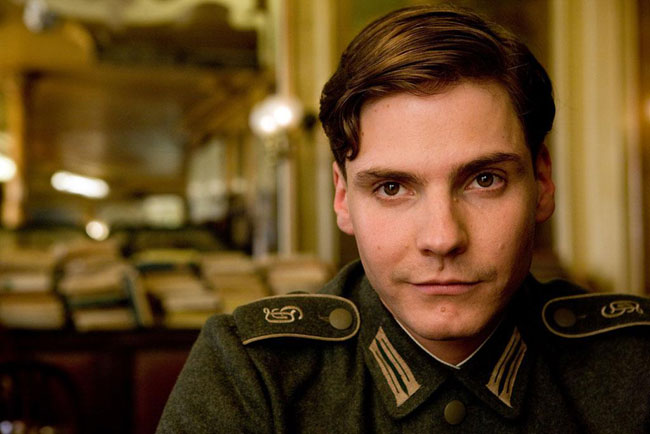
Daniel Brühl (as war hero Fredrick Zoller) looking for love not war, with Großdeutschland shoulder straps on a period-perfect uniform!
And speaking of this being a Tarantino film, what would one be without the expected, if not obligatory, gratuitous focus on women’s feet. Yes, you read that correctly. A “gratuitous focus” on women’s feet! This is such a motif in Tarantino films that I’m actually planning to do an article about it soon enough. (And be sure to look for it right here on Space Jockey Reviews!) As a voyeuristic preview, consider the appearances of shoeless, sockless, totally bare female feet in other Tarantino classics such as Pulp Fiction and Kill Bill (featuring the feet of Uma Thurman) From Dusk Till Dawn (featuring Juliette Lewis and Salma Hayek feet), Death Proof (where the beautiful Sydney Tamiia Poitier, while posing her bare legs and feet, actually says, “I said, stop thinking about my feet.”), and the list goes on. Is there a carnal connection? I’d say, “Of course!” “And where do the gratuitous feet make their appearance in Inglorious Basterds?” you ask. Without giving too much away, I’ll just say that it’s in not one, not two, but three scenes! First, it happens when the, again beautiful, Diane Kruger is receiving makeshift medical attention in a particular scene with Lt. Raine and company. Next, it happens with the closeup of Kruger’s toes sticking out of a cast, shaped as a matching high heel. (Ha ha!) And finally, it happens when Kruger gives up her shoe to Standartenfuhrer Landa, after he demands it. In each case, the focus on Kruger’s feet is undeniable and certainly intentional. Does it get any more gratuitous than this? I doubt it! No, it’s not that any of this is bad at all; but it sure is worth mentioning. Now, enough about feet; I’ll expose all the bare details in a fetish-filled feature soon enough. Stay tuned!
Along with the foot play, I must also applaud Inglorious Basterds for not making the mistake that so many big-budget and otherwise great war films do. The uniforms in Basterds are decorated with correct insignia for the ranks and branches of the German officers and soldiers of the time! Yes, where other films in the family fail, Basterds succeeds with a pedigreed performance. Kudos to Tarantino and all involved for this! An otherwise epic movie can be ruined by distracting, incorrect insignia; but Basterds, here, is promoted to the highest ranks!
“And the German will be sickened by us; the German will talk about us; and the German will fear us!” ~ Lt. Aldo Raine
With all its greatness, Inglorious Basterds will be an offensive movie to many, (and all out ignored by others for its mere title), even though, for one, it exceeds every excess in properly insulting Nazis. (Yes, believe it or not, it actually gives National Socialism a bad name, worse than many ways we’ve seen it done in over sixty years since the war’s end.) Yes, most people will find something disgusting, distasteful, etc. about it, no matter what justice it delivers on top of all else. However, it’s really no more offensive than anything else you’ve seen before about a group of inglourious Nazi-scalping basterds who, more than coincidentally, happen to be Jewish. So, set aside your hang-ups, morals, ethics, political correctness, and overblown virtues for a couple of hours, at least, and enjoy the story that never was, about a group of basterds that never were. If you’re like me, you’ll even happily feel like a basterd in the end.
“Each and every man under my command owes me one hundred Nazi scalps…and I want my scalps!” ~ Lt. Aldo Raine
For a description of Rocket Rating 10, click on the Rocket Meter above!
You may also like these!
